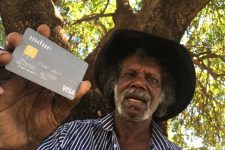Less Cash for Centrelink Recipients: Government Hails Debit Card Trial a Success

The federal government has declared its twelve-month trial of ‘cashless’ welfare cards a huge success, after an evaluation found it has contributed to a reduction in alcohol consumption and gambling in rural communities.
The government is so pleased with the results that it has announced an extension of the trial in Ceduna and East Kimberley, foreshadowing a rollout in other areas as well.
The cashless debit card was introduced last year into the regions, which are predominantly comprised of Indigenous people. It works by quarantining 80 per cent of welfare payments so they cannot be used for ‘non-essential’ purposes such as alcohol and gambling, with the remaining twenty per cent transferred into the recipient’s bank account, where it can be withdrawn as cash.
The evaluation
While Social Services Minister Alan Tudge claims the “strong independent evaluation results” prove the trial has been effective in reducing alcohol consumption and gambling, there are concerns about the card’s impact on crime rates.
The end-of-trial report by Orima research was based on data and interviews collected during the first six months of the trial. It found that perceptions varied between community members and those who were actually using the card.
Twenty-two percent of users reported that the card made their lives better, and about a quarter said they were drinking less alcohol.
Thirty-one per cent reported being better able to care for their children and saving money, which was one of the main purposes of the card.
Concerns
However, forty-nine per cent of respondents reported that the card has made their lives worse.
Health and social services staff believe this is because the trial was not properly targeted. These experts witness first-hand the devastation caused by substance abuse. They suggest the card may be appropriate for those identified as drug and alcohol abusers, but inappropriate for those who do not experience such issues.
Concerns have also been raised that the government-funded evaluation fails to provide the full picture.Critics of the card point to South Australian police crime figures for the Ceduna area, which suggest that aggravated robbery went up by a whopping 120 per cent and fraud, and deception and related offences increased by fifty-one per cent over the course of the trial.
There are also reports of welfare recipients changing their address to avoid receipt of the card, increased incidences of prostitution, and merchants and taxi drivers ‘doing deals’ whereby they overcharge card holders and refund the difference in cash.
There are further reports of an increase in ‘humbugging’ – where people harass or even threaten family members for money, leading to confrontations and even violence.
The increase in crime is said to be symptomatic of addicted persons employing any means necessary to support their habits.
One thing that everyone involved agrees is that a multi-faceted approach is required to address entrenched problems with alcohol and drug addiction.








